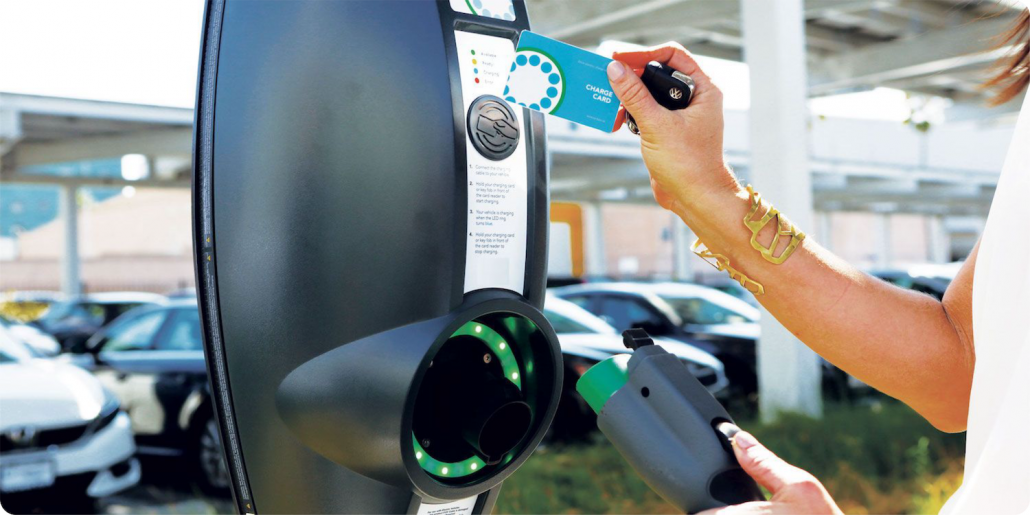April 19, 2021 | Cristina Dinulescu
Electric vehicles have grown in popularity over the recent years and seem to be indeed the future of the auto industry. Sustainability, industry leadership and environmental stewardship are just a few of the many reasons businesses should embrace electric cars and invest in car charging stations. Depending on your business, such an investment can be quite large, not just in terms of finances, but also in terms of planning and implementation.
The U.S Department of Energy provides assistance to employers who wish to properly implement workplace charging through the Clean Cities Workplace Charging Toolkit, where you can find information on planning, organizing and executing successful, as well as educational, charging events.
There are three main stages when it comes to commercial EV charging stations, the planning stage, where an evaluation is needed to determine if a charging program is right for you, the installation stage and the post-installation management.
Planning For Car Charging Stations At Your Business
Before investing in electric vehicle charging stations, it’s important to understand how this step can support your business sustainability portfolio. Determining whether or not it’s the right step for your organization usually starts with an employee survey as to gauge their interest. This can also be scaled to a customer survey if your business operates in the hospitality industry.
There are several aspects to explore and take into consideration when you are at the evaluation stage:
- Electricity & Emissions – you should not only explore electricity sources, but also the way the grid mix impacts the emission reduction benefits that come from employees commuting with electric vehicles;
- Emission Reduction – workplace charging is not the only sustainable commuting option, and you should research how it compares to others when it comes to reducing greenhouse gas emission;
- Credits & Certifications – at the planning stage, you should evaluate how the installation of the charging stations can help your business get certified by green building programs, such as Sustainability Tracking, Assessment & Rating Systems (STARS), ENERGY STAR® for Buildings and Plants, or Leadership in Energy & Environmental Design (LEED).
Installation of Car Charging Stations
If the Evaluation and Planning stage determined that EV charging stations are a smart step for your business, then the actual installation is the next step. You should be able to connect the charging equipment to an electricity source, either the grid or solar panels.
There are different types of equipment as well, such as Level 1, Level 2 and DC fast charging stations. They each offer their own benefits and come with different considerations. Level 1 chargers, for instance, are more affordable, but they also charge cars at a much slower rate, which means during a standard workday only one car can use them.
Level 2 car charging stations are the most common equipment used in commercial properties, such as office buildings, restaurants, hotels and so on. These can charge more than one vehicle per day, and they enable easy sharing by using multiple connectors. Direct Current charging stations are often the most expensive to install and they’re generally used in large establishments, shopping malls and other such commercial applications.
How To Manage Your Car Charging Stations
A safe and successful commercial charging experience is dependent on clear guidelines when it comes to administration, registration and liability, sharing and pricing. All of these aspects are part of managing workplace charging.
As far as administration goes, consider designating a responsible group or individual for the maintenance and overall ongoing operation of the charging stations, as well as related costs. If your business is large enough to have a facilities department or manager, then this would usually fall under their purview.
Charging access is another aspect to consider when managing workplace access. Do you want to restrict access to employees only? Would you like to allow visitors to use during certain hours of the day? All of these questions need answers for a good management of charging stations.
It is not enough to simply designate a person or a department responsible for the ongoing operation of the stations, it should also be very clear who’s in charge of enforcing the charging policies. Enforcement and security also includes preventions against vandalism or theft.
Last, but not least, registration and liability are very important for a proper management of EV charging stations at a place of business. Many companies require their employees to register their vehicle, and some even ask for waivers. The registration will allow you to properly account for the number of electric vehicles that may be using the charging stations, as well as the type of cars. If the operation of the chargers is dependent on a network that requires access cards or key fobs, then knowing the exact number of employees and vehicles is essential.
A waiver of liability is a standard practice for employers offering workplace charging. It broadly stipulates that the employees are responsible for any risks associated with the use of the car charging stations.








